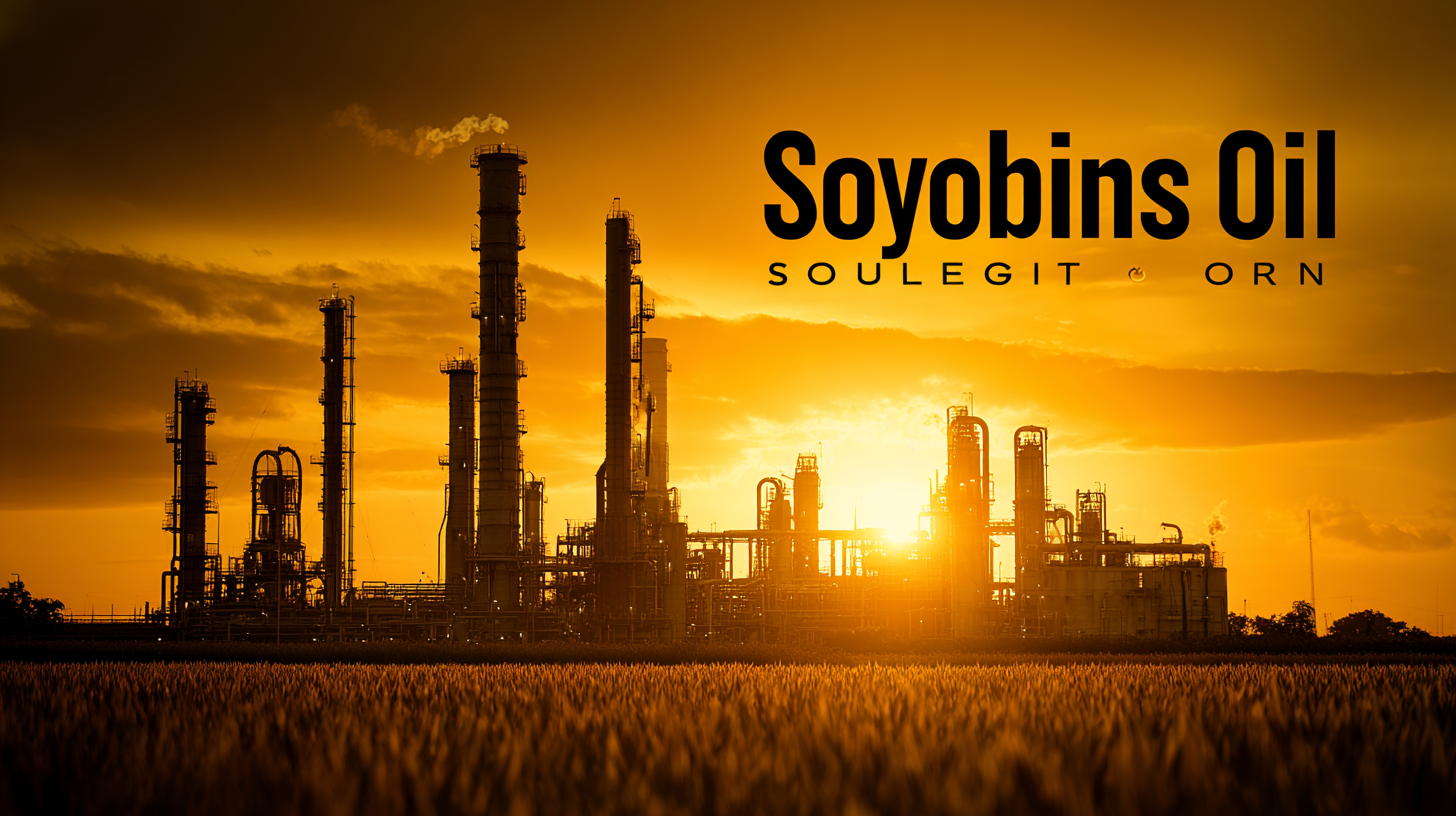Solutions for Sourcing the Finest Soybean Oil for Global Buyers
As the global demand for high-quality Soybean Oil continues to rise, driven by its versatile applications in food production and industrial uses, sourcing the finest products has become increasingly crucial for importers. According to the latest reports from the United States Department of Agriculture (USDA), global Soybean Oil consumption is projected to reach 18.5 million metric tons by 2025, reflecting a robust growth trend. With this expanding market, understanding the nuances of import and export certification is vital for buyers seeking to ensure quality and compliance. Various certifications, such as ISO standards and organic certifications, play a pivotal role in establishing trust and maintaining product integrity within the supply chain. This blog will delve into effective strategies for sourcing premium Soybean Oil and navigating the intricate certification processes necessary for global trade.

Understanding the Global Soybean Oil Market: Trends and Opportunities
The global soybean oil market is evolving, driven by
increasing demand for refined soybean oil and its derivatives. According to projections, the global refined soybean oil market is expected to maintain a growth trajectory with a CAGR of approximately 1.1%, reaching 10 million tons by 2035. This upward trend is indicative of a broader movement within the edible oil sector, which was valued at approximately USD 171.94 billion in 2023 and is expected to climb to USD 253.75 billion by 2030. Such promising figures highlight the importance of strategic sourcing and market understanding for global buyers.
For businesses looking to navigate this dynamic market, leveraging up-to-date data is essential. The fluctuating prices and supply dynamics, particularly in the South American region, underscore the importance of staying informed about market trends and forecasts. A well-rounded approach to sourcing not only enhances product quality but also ensures competitiveness in a crowded marketplace.
Tips: Regularly consult market research reports to track price volatility and emerging trends in soybean oil. Establish strong relationships with suppliers who can provide reliable insights and consistent supply. Lastly, consider the environmental impact of sourcing choices, as the demand for eco-friendly products continues to rise in industrial applications.
Key Factors to Consider When Sourcing High-Quality Soybean Oil
When sourcing high-quality soybean oil, several key factors must be considered to ensure that buyers obtain the finest product available in the market. One of the primary aspects is the selection of the right soybean variety, as different genotypes exhibit varying traits related to oil content and composition. Research has identified significant relationships between the chemical characteristics of soybeans and the quality of the oil they produce. This understanding can help buyers choose the best varieties that meet specific quality demands.
Additionally, it's essential to evaluate the processing methods used for extracting oil. Sustainable practices, including zero-waste processing systems, can enhance the quality and sustainability of soybean oil. These methods not only minimize environmental impact but also ensure that by-products are utilized effectively. Furthermore, the oxidative stability of the oil should be assessed, as factors such as storage conditions and packaging can significantly influence shelf life and overall quality. By considering these factors, global buyers can make informed decisions when sourcing premium soybean oil.
Quality Analysis of Soybean Oil Sourcing
Identifying Reliable Suppliers: A Comprehensive Checklist
When sourcing the finest soybean oil, identifying reliable suppliers is crucial for global buyers. A comprehensive checklist can streamline this process. First, evaluate the supplier's credentials. Ensure they are certified and comply with international quality standards. This not only guarantees product quality but also signifies a commitment to ethical practices.
Tips: Always request samples before making a bulk purchase. This allows you to assess the oil's quality and characteristics firsthand. Additionally, check for transparency in sourcing. Reliable suppliers should be able to trace their products back to the origins, assuring you of their commitment to sustainability.
Furthermore, consider the supplier's reputation in the market. Look for customer reviews and testimonials, which can shed light on their reliability and service quality. A supplier with a solid track record is more likely to deliver consistent results, making them a valuable partner in your sourcing endeavors.
Tips: Establish open lines of communication to discuss your specific needs and expectations. A responsive supplier demonstrates professionalism and will be more inclined to accommodate your requirements.
Solutions for Sourcing the Finest Soybean Oil for Global Buyers - Identifying Reliable Suppliers: A Comprehensive Checklist
| Supplier Location | Quality Certification | Production Capacity (tons/month) | Pricing (USD/ton) | Lead Time (days) | Customer Reviews (out of 5) |
|---|---|---|---|---|---|
| United States | USDA Organic, Non-GMO | 5000 | 800 | 20 | 4.8 |
| Brazil | ISO 9001, Kosher | 7000 | 750 | 25 | 4.7 |
| Argentina | GMP Certified | 6000 | 720 | 30 | 4.5 |
| China | HACCP, Non-GMO | 8000 | 700 | 15 | 4.6 |
| India | FSSAI, ISO 22000 | 4000 | 600 | 35 | 4.4 |
Sustainable Practices in Soybean Oil Production: What Buyers Need to Know
Sustainable practices in soybean oil production are becoming increasingly crucial for buyers who are conscious of environmental and social impacts. One important aspect to consider is the sourcing of soybeans from farms that adhere to eco-friendly farming methods. These practices reduce deforestation, preserve biodiversity, and enhance soil health. Buyers should look for certifications such as the Roundtable on Sustainable Palm Oil (RSPO) or equivalent programs that guarantee responsible sourcing.

Additionally, the use of innovative technologies in soybean oil production can significantly minimize carbon footprints. For instance, precision agriculture techniques help to optimize resource usage, leading to reduced waste and improved yield. Buyers should seek suppliers who invest in such technologies, ensuring that their soybean oil is not only high quality but also produced with a commitment to sustainability. By prioritizing these factors, global buyers can make informed choices that align with ethical standards and contribute to a greener planet.
Logistics and Distribution Solutions for Efficient Soybean Oil Sourcing
When sourcing the finest soybean oil for global buyers, logistics and distribution play a critical role in ensuring efficiency and reliability. The process begins with establishing a solid supply chain that connects suppliers, processors, and distributors. By leveraging advanced logistics solutions—such as real-time tracking, temperature-controlled transport, and optimized routing—companies can significantly reduce delays and maintain oil quality during transit. These technologies not only enhance transparency but also allow for proactive decision-making in case of unforeseen challenges.
In addition, building strong relationships with logistics partners is essential for seamless distribution. Collaborating with experienced freight forwarders and local distributors can facilitate navigating complex customs regulations and ensuring compliance with international trade standards. This partnership approach enables quicker response times and fosters a more resilient supply chain. By prioritizing logistics and distribution solutions, global buyers can secure high-quality soybean oil while enhancing operational efficiency and customer satisfaction.






